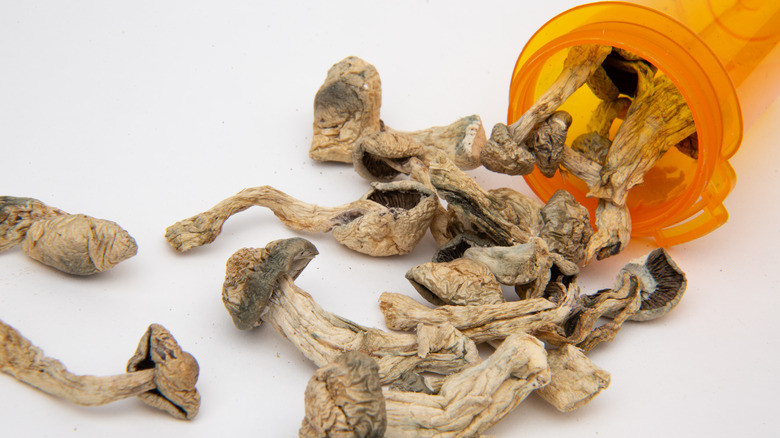Could Psychedelics Be The Next Breakthrough Treatment For Cancer Patients' Mental Health?
Up to 35% of cancer patients experience mental health difficulties in conjunction with a cancer diagnosis, according to 2020 research published in Epidemiology and Psychiatric Sciences. While not formally recognized as a mental health disorder, an additional 15% to 20% of cancer patients experience existential distress, such as a loss of meaning or spiritual morale.
Psilocybin, a chemical derived from a type of mushroom native to areas of the U.S., Mexico, and Central America, is known for its hallucinatory effects in humans when ingested (via the Drug Enforcement Administration). While psilocybin, or magic mushrooms, is legal in the U.S., it is classified as a Schedule I substance under the Controlled Substances Act and, therefore, is not approved for accepted medical use.
Over the years, the number of scientific studies looking at the clinical potential of psilocybin and other psychedelics to relieve mental health-related stress has grown (via The Washington Post). Although the study is still underway, a new series of clinical trials show promise in the use of psilocybin as a potential treatment method for major depressive disorder in cancer patients. Oncologist Manish Agrawal, principal investigator on one of the clinical trials, shares via The Washington Post how doses of psilocybin appear to affect cancer patients experiencing anxiety or depression related to their cancer diagnosis.
Psilocybin shown to reduce death anxiety in cancer patients
Agrawal explains how two patients in the clinical trial experienced a mindset shift around mortality while using the psychedelic that resulted in decreases in mental and emotional distress (via The Washington Post). Overall, in 15 out of 30 patients, clinical depression symptoms were gone after a period of eight weeks following treatment with a single dose of psilocybin in combination with therapy.
Such evidence appears to be in alignment with alternate studies, such as a long-term follow-up study conducted by researchers at the NYU Grossman School of Medicine. Researchers found that more than four years after a one-time dose of psilocybin, cancer patients experienced decreases in death anxiety, hopelessness, and depression (via NYU Langone Health).
Experts believe the mental health-boosting effects of psychedelics may be due to their potential to rewire the brain. According to 2021 research cited in the World Journal of Psychiatry, " ... psychedelic agents may induce rapid synaptic plasticity, and this plasticity may be a key mechanism by which they can exert long-term antidepressant effects." Some scientists believe approval for the use of psychedelics in the treatment of clinical depression in cancer patients is not far off (via KUER). Dr. Anna Beck, director of the Huntsman Cancer Institute, states via KUER, "Psychedelic medicine is the only thing that has been shown to make a difference in terms of alleviating some of the existential distress [felt by cancer patients]."


